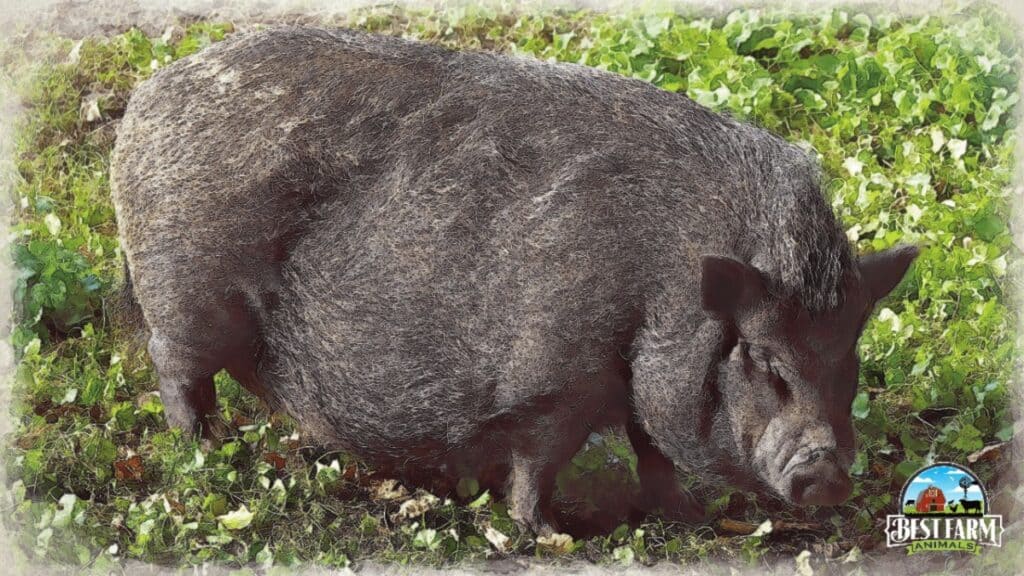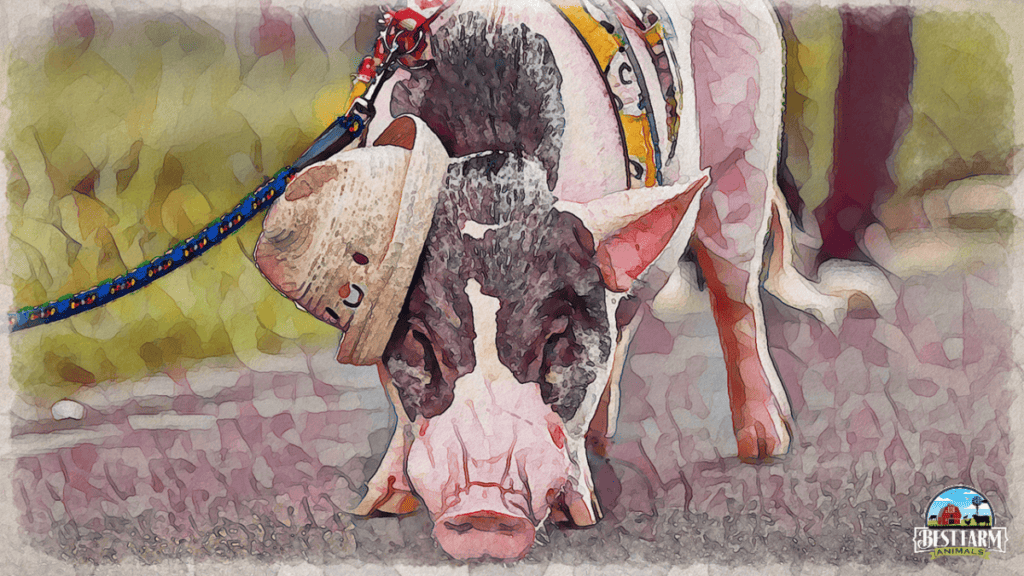Pigs can live a pretty long life, which is great news if you have a pet pig or a prized sow. Pigs can live into their teens and there are several things you can do to extend your favorite pig’s life.
Table of Contents
- How to Increase My Pig’s Life Expectancy
- 1. Feed Pigs Healthy Food (Not Just Anything)
- 2. Healthy Pigs Need Space and Exercise.
- 3. Provide a Clean, Safe Environment for Pet Pigs
- 4. Seek Vet Help in Emergencies About Your Pet Pig
- 5. Abandonment of Pet Pigs as a Cause of Premature Death
- Tips To Help Your Pig Have a Longer Lifespan
- FAQs
How to Increase My Pig’s Life Expectancy
Like any good pet pig owner, or responsible pig breeder, you want to ensure your pigs are healthy and in the best possible physical condition.
This will ensure your pigs don’t suffer early mortality and can live long lives like your pet.
1. Feed Pigs Healthy Food (Not Just Anything)
Always feed your pigs fresh, natural foods like cabbage, lettuce, carrots, and apples.
Never feed leftovers that may contain unsafe foods for pigs, because unsafe human food leftovers are how diseases and illnesses often start.
Your pet pig is not your garbage bin. Pigs should be fed pig-safe food that is commercially designed for their particular breed. Since you are not fattening up your pet pig for slaughter, you should provide a low-carbohydrate feed that will sustain them but not lead to obesity.

Ensure your pet pig has enough water; if they sleep outside in the pen, ensure their water supply doesn’t freeze at night. A water heater may be required in cold climates.
- Ensure pigs receive a balanced diet with the right mix of nutrients.
- Monitor food intake to prevent overfeeding or underfeeding.
- Provide clean and uncontaminated water at all times.
2. Healthy Pigs Need Space and Exercise.
Pet pigs require exercise and space to relax. While a pig raised for slaughter doesn’t necessarily need a lot of space to move around, a pet pig is hopefully going to live much longer.
So, having enough space to explore, satisfy their digging instincts, and forage for natural foods is an ideal environment.
Ensure your pig gets enough sunlight to boost their vitamin D3 production, but be aware that a pig has light-toned skin that easily sunburns (unless it’s a brown or black-skinned pig).
If you keep your pig in a small yard or a city apartment, be sure you take your pig for regular strolls. While pigs can run, it is not healthy for their joints when they become larger. Instead, let them mozy along on a harness with you at the park or around the block.
Your pig should have access to some good natural mud, fresh water to rinse in, and a nice dust bath area where they can roll to maintain their skin’s optimal condition.
You can bathe your pig, but overdoing this will lead to crusty skin and serious skin problems. After all, a healthy pig is a happy pig.
3. Provide a Clean, Safe Environment for Pet Pigs
Most importantly, when it comes to your pig’s health, it is vital that you keep them in a safe environment. If your pig gets out of your yard, then they may be hit by a car (ending their life early), or dogs may attack them.
Ensure your pig’s environment is safe, secure, and toxin-free. Fine-tuning your home like you would for a human baby is advised if your pig is an indoor pig.

Consider whether there are electrical wires in the range of your pig’s mouth, if the furniture paint is lead-free and if there are furniture items that your pig may run over, potentially injuring themselves.
Finally, it’s your responsibility to keep your pet pig safe so that they can reach a ripe old age.
4. Seek Vet Help in Emergencies About Your Pet Pig
You can take steps to ensure your pet pig lives a healthy and long life. It’s not rocket science!
Simply ensure you cover all the bases your own child has: is your pet eating correctly, has your pig been vaccinated for contagious diseases, and do you regularly take your pet pig for a vet check?
If your human child is ill, you won’t hesitate to consult with a doctor. So, if your pet pig is unwell, don’t hesitate to speak to a vet and get them the treatment they need.
Also, make sure your pet pig is happy. Because when a pig is happy, they will live longer since they will be healthy too. Pigs are group animals, so don’t keep only one pig on its own.
Rather keep two or three pigs together to meet their social needs.
- Establish a relationship with a qualified veterinarian.
- Schedule regular check-ups and consult a vet when health issues arise.
- Follow vaccination and medication recommendations.
5. Abandonment of Pet Pigs as a Cause of Premature Death
Another sad reason many pet pigs don’t live to a ripe old age is that most people are completely unprepared for what is involved in keeping a pig as a pet.
Therefore, many pet pigs are abandoned annually when people dump them in animal rescues and shelters.

The reasons for their abandonment are often as silly as “I didn’t know the pig would grow that much,” or “I can’t teach the pig any tricks,” or “This pig is so messy.”
So, before you think about adopting a pet pig, do your homework and determine whether you would be a good pet pig parent.
Tips To Help Your Pig Have a Longer Lifespan
Helping pigs live longer requires providing them with proper care and attention to ensure their well-being and health. Here are some key points to consider:
Comfortable Housing
- Maintain clean and well-ventilated pig pens or housing facilities.
- Provide enough space for pigs to move, rest, and socialize.
- Protect them from extreme weather conditions.
Health Management
- Implement a vaccination and deworming schedule to prevent diseases.
- Regularly inspect pigs for signs of illness or distress.
- Isolate sick pigs to prevent the spread of diseases.
Behavioral Enrichment
- Encourage natural behaviors like rooting and foraging.
- Provide mental stimulation with toys or objects to prevent boredom.
- Allow social interaction with other pigs to reduce stress.
Stress Reduction
- Minimize handling stress and loud noises.
- Maintain a consistent routine to reduce anxiety.
- Handle pigs gently and calmly.
Proper Handling and Transport
- Use humane handling techniques during transportation.
- Ensure transportation vehicles are well-ventilated and clean.
- Avoid overcrowding during transport.
Ethical Practices
- Follow ethical and humane farming practices.
- Avoid unnecessary use of antibiotics or growth hormones.
- Consider alternatives to practices like gestation crates.
By following these guidelines, you can help pigs live longer, healthier lives while also promoting ethical and sustainable pig farming practices.
Increasing Pigs Lifespans FAQs
What is the average lifespan of a pig?
The average lifespan of a pig varies depending on factors like breed, care, and purpose.
While commercially raised pigs are typically harvested for meat between 5 to 7 months of age, with proper care, they can live up to 10-15 years or more.
How can I ensure my pigs live longer?
To increase the lifespan of your pigs, it’s crucial to provide them with a well-balanced diet, clean water, comfortable housing, and regular veterinary care.
Minimizing stress, practicing humane handling, and promoting natural behaviors can significantly extend their lives.
What role does nutrition play in pig longevity?
Nutrition is essential for pig health and longevity. Ensure pigs receive a balanced diet with the right nutrients, including proteins, vitamins, and minerals.
Avoid overfeeding and underfeeding, as these can lead to health problems.
How do I prevent diseases in my pig herd?
Preventing diseases among your pigs involves a combination of strategies, including vaccination, deworming, and maintaining good hygiene in the pig environment.
Regular health checks by a veterinarian can help detect and manage potential health issues.
What is the importance of proper housing for pigs?
Proper housing is vital to protect pigs from harsh weather, provide adequate space, and reduce stress. Clean, well-ventilated pens or facilities are essential for their well-being.
Can pigs be kept as pets, and if so, how can I ensure their longevity?
Yes, pigs can be kept as pets.
To ensure their longevity as pets, provide them with suitable living conditions, proper nutrition, companionship (as they are social animals), and regular veterinary care. Consult with a veterinarian experienced in pig care for guidance.
What are some common signs of illness in pigs?
Common signs of illness in pigs include lethargy, loss of appetite, coughing, sneezing, diarrhea, lameness, or unusual behavior. Promptly consult a veterinarian if you observe any of these signs.
Is it possible to extend the lifespan of pigs in commercial farming practices?
In commercial farming, the primary goal is efficient meat production. However, adopting ethical and humane farming practices, such as providing better living conditions, minimizing stress, and following responsible antibiotic use, can contribute to the overall well-being and potentially extend the lives of farm pigs.
Remember that pig longevity depends on various factors, and each pig’s individual care and genetics can play a significant role in determining how long they live.
Proper management and attention to their needs are key to ensuring a longer and healthier life for pigs.

